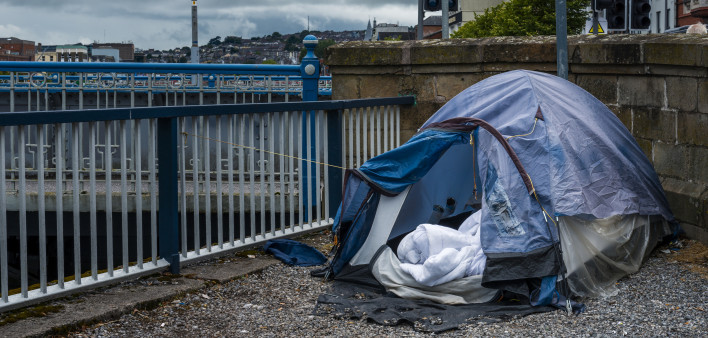Combining nonjudgmental, caring staff with same-day prescribing, daily dispensing and short-term dosing made HIV pre-exposure prophylaxis (PrEP) doable for a group of homeless people who inject drugs in Boston, according to a study presented at the 11th International AIDS Society Conference on HIV Science (IAS 2021).
This is important because while some studies have found that PrEP is effective in stopping HIV acquisition via sexual exposure among people who inject drugs, most are not taking it. According to the 2018 National HIV Behavior Survey, 92% of people who inject drugs in Boston are eligible for PrEP, but only 2% had ever used it.
A previous study found that after six months, about 44% of people in the Boston Health Care for the Homeless Program (BHCHP) who were prescribed PrEP were still taking it. Angela Bazzi, PhD, associate professor of family medicine and public health at the University of California, San Diego, said that rate is notable because it’s comparable to other populations that have greater access to resources. So Bazzi and colleagues undertook this qualitative study to figure out what supported and what hindered PrEP use among people who inject drugs experiencing homelessness.
BHCHP’s PrEP program has offered the prevention pill to people who inject drugs and are homeless since October 2018. The program offers same-day PrEP prescribing, including seven-day supplies if desired, or daily PrEP dispensing via street outreach by nurses and navigators. It also has an onsite pharmacy, onsite storage of medications, counseling and support for managing PrEP side effects. The program offers all this in coordination with other BHCHP services, such as medication-assisted addiction therapy (for instance, methadone or buprenorphine), and services from other organizations, like daily breakfast and syringe services.
Bazzi and colleagues conducted in-depth interviews with 21 of BHCH’s more than 200 PrEP clients as well as 11 BHCHP staff and clinicians. They used videoconferencing to conduct the interviews during the COVID-19 pandemic, from March to December 2020.
All client participants were at least 18 years old, with a median age of 36 years. Nearly one in five (19%) were Latino, and the same proportion were Black; 62% were white. Nearly one in three participants were women. All had used injection drugs in the previous month, with 95% reporting injecting heroin or fentanyl, 75% reporting cocaine and/or crack and 75% reporting meth use in the previous month—indicating a high rate of polysubstance use. In addition to injecting, 80% reported marijuana use, 85% reported using benzos, including valium, Ativan and Xanax, and 65% reported taking the anticonvulsant gabapentin. Alcohol use was far less common, with only 40% of participants reporting using it in the past month. Half of the participants reported injecting something seven times a day.
Participants reported that they were concerned about HIV, and different clients reported that they appreciated the flexible design of the PrEP program to accommodate them, whether that was daily dispensing of medications or providing medication storage to prevent the pills from being stolen. Unlike other populations, clients of this clinic reported that prescribing a shorter course of PrEP—a seven-day supply—facilitated regular PrEP use, since it accounted for the likelihood of theft. Plus, working with the syringe services program and being present during community programs, like free breakfasts, made taking PrEP part of a one-stop shop, clients reported.
What’s more, it was the long and trusting relationships clients had with BHCHP staff that kept them coming back, Bazzi said. The staff interviewed for this study had been there an average of six years and developed a rapport with their clients during that time.
According to a 42-year-old woman who’s been on PrEP for two years through the program, “It’s the people that are involved… they’re like angels. I think that’s why I’m still taking [PrEP] every day. They’re personable and really comfortable to be around…. People can be stuck-up and look down on you [but] no way, they’ve never done it once. And a lot of people…come in being really nice and then start getting bitter…. But [the PrEP program staff] have never changed who they were, not once.”
“Innovative programming is clearly needed,” Bazzi said. “In summary, we recommend many of the innovative programmatic elements that have made Boston Health Care for the Homeless Program so successful, and this includes same-day and short-term prescribing, onsite pharmacy and medication storage [and] daily PrEP dosing as well as other services.”
Click here to read the study abstract.
Click here for more news about PrEP.
Click here for more reports from IAS 2021.







Comments
Comments